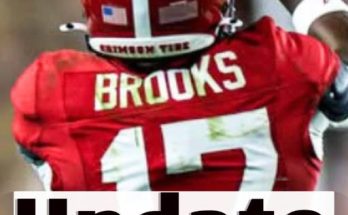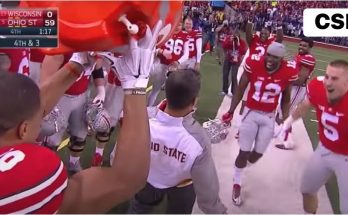Following a dreadful performance against Texas A&M on Saturday night, discussions about Brian Kelly’s buyout have resurfaced once more, casting a shadow over LSU’s football program and sparking debate about the direction of a team that once looked like a powerhouse under his leadership. For a program with the expectations, history, and resources of LSU, mediocrity is never tolerated. When the Tigers hired Kelly from Notre Dame in 2021, it was seen as a statement move—a commitment to excellence, to reclaiming the heights of the Ed Orgeron and Joe Burrow era. But fast forward to today, the honeymoon period is long over, and patience in Baton Rouge is wearing thin.
Saturday night’s game against Texas A&M was supposed to be an opportunity for LSU to reassert itself in the SEC picture. Instead, it turned into a showcase of everything that’s gone wrong. Missed tackles, blown assignments, unimaginative play-calling, and a lack of urgency plagued the Tigers from kickoff to final whistle. What was once viewed as a disciplined, detail-oriented program under Kelly now looks confused, disjointed, and uninspired. The loss wasn’t just another defeat—it was an indictment of the team’s preparation, focus, and leadership.
In college football, perception is everything. When a team like LSU looks lost on national television, the whispers start quickly: is Brian Kelly still the right man for the job? And those whispers inevitably turn toward one crucial question—how much would it cost to move on? Kelly’s buyout, once thought to be an obstacle that guaranteed him long-term job security, is no longer viewed the same way. When boosters and athletic directors sense a program slipping, even massive buyouts become negotiable, and LSU’s history of aggressive decision-making only fuels that possibility.
The conversation around Kelly’s buyout isn’t new—it’s flared up before, particularly after puzzling losses in seasons that promised more. But this time feels different. The Tigers didn’t just lose to Texas A&M; they looked outclassed. The Aggies, playing under an interim head coach, displayed more energy, more discipline, and more cohesion than a team that should have been superior in talent and preparation. That disparity reflects poorly on the man paid to bring out the best in his roster.
When Kelly arrived at LSU, his resume was undeniable. He was Notre Dame’s all-time winningest coach, a proven program builder, and a man who preached accountability, attention to detail, and consistent excellence. LSU believed it was getting a culture changer—a coach who could blend the Tigers’ natural talent pool with a foundation of discipline and structure. The first year seemed to validate that hope, as Kelly led LSU to an SEC West title and a New Year’s Six bowl berth. Fans celebrated his calm demeanor and methodical approach, viewing him as the steady hand needed after the chaos of the post-championship years.
But since that initial success, cracks have widened. Recruiting remains strong on paper, but player development has been inconsistent. Defensive struggles have become a recurring theme, with poor tackling, questionable schemes, and a lack of adjustments leaving fans frustrated week after week. Even with elite offensive weapons, LSU’s inability to impose its will on inferior opponents raises questions about effort and preparation. Those issues point squarely at coaching—and when a program as proud as LSU fails to meet its lofty standards, the head coach becomes the natural scapegoat.
In Baton Rouge, football isn’t just a sport—it’s a religion. The fans demand excellence, not excuses. They’ve seen national championships under Nick Saban, Les Miles, and Ed Orgeron, and they expect to be in that conversation every year. For Kelly, that pressure has always been part of the deal. He was brought in not to rebuild slowly, but to win immediately and sustain success at the highest level. The problem is, his LSU tenure has begun to resemble his late years at Notre Dame: plenty of talent, plenty of potential, but an inability to get over the hump in big games.
Every poor performance intensifies scrutiny, and the Texas A&M game poured gasoline on that fire. Message boards, talk shows, and social media have been ablaze with fans calling for accountability. While some still believe Kelly deserves more time to stabilize the program, others argue that the warning signs are too clear to ignore. The buyout number—once a comfort for stability—is now being dissected as a necessary cost of doing business in modern college football. In today’s era of NIL money and booster-funded programs, financial hurdles no longer carry the weight they once did.
Kelly’s situation is a reminder of how quickly fortunes can change in college football. Less than two years ago, he was hailed as a savior. Now, he’s being discussed as a liability. That shift underscores the ruthless nature of the sport, especially in the SEC, where patience is scarce and results define everything. For LSU, mediocrity isn’t just disappointing—it’s unacceptable. The Tigers have the facilities, recruiting base, and financial backing to compete for championships. Anything less feels like failure.
Supporters of Kelly argue that rebuilding a program takes time, especially in the transfer portal era, where rosters turn over rapidly. They note that LSU has dealt with injuries, defensive instability, and a new wave of young talent that needs seasoning. But critics counter that those explanations ring hollow when other programs manage to overcome similar challenges. The truth likely lies somewhere in between. Kelly is a skilled coach with a strong track record, but something about his LSU tenure hasn’t clicked the way many expected. Whether it’s cultural fit, staff alignment, or motivational disconnect, the chemistry hasn’t translated to consistent dominance on the field.



